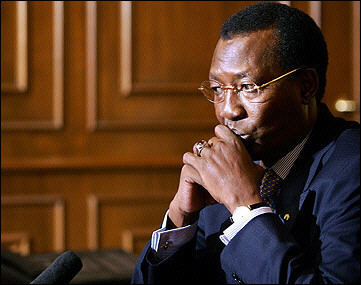Chad claimed it had put down a bid by rebels to topple President Idriss Deby
Itno and blamed neighbouring Sudan for fomenting the coup attempt.

The Chadian government
claimed that it had put down a rebel attack aimed at toppling President
Idriss Deby Itno, seen here in 2004, and blamed neighboring Sudan for
fomenting the coup attempt.[AFP/File] |
"The rebel columns have been completely destroyed... The situation is
completely under control," Deby told Radio France Internationale (RFI) early on
Thursday.
Intense fighting broke out on the outskirts of N'Djamena at dawn as rebels of
the United Front for Change (FUC) advanced on the capital, a number of them
entering the city, military sources said.
Light gunfire and explosions rang throughout the morning but fell silent by
mid afternoon, an AFP correspondent in N'Djamena said.
The government later laid the bodies of dead and injured rebels out on the
lawn in front of the parliament building and claimed hundreds of insurgents had
been slain.
Chadian Foreign Minister Ahmat Allami, speaking in Cairo, accused Sudan of
supporting the rebellion in an act of "premeditated aggression" against Chad.
Humanitarian sources said at least 250 people were injured in the fighting,
which pitted the Chad army against FUC rebels, although there was no death count
available.
At least 100 people, most of them civilians, were taken to N'Djamena's two
main hospitals, while more than 150 wounded soldiers from Deby's army were taken
to the military hospital, the same sources reported.
United Nations Secretary-General Kofi Annan was said to be "greatly
troubled", while the European Union also voiced deep concern at the violence
which comes just weeks before presidential elections.
The north-central African country plays host to some 200,000 refugees from
Sudan's western Darfur region, but on Thursday, officials said large numbers of
Chadian civilians fleeing the escalating fighting between government troops and
rebels were crossing into Darfur.
And authorities in Cameroon said hundreds of people, many of them diplomats,
were fleeing from N'Djamena across the Logone river to the border town of
Kousseri.
France, the former colonial power which has a 1,200-man contingent deployed
in Chad, was accused by an FUC leader of bombing rebel-held towns in the east,
causing civilian casualties.
The defence ministry in Paris acknowledged that one of its Mirage jets had
fired warning shots near a rebel column advancing on N'Djamena on Wednesday but
said it was "political signal" of its intent to protect some 1,500 French
civilians in Chad.
French Foreign Minister Philippe Douste-Blazy said Paris was taking "all
possible measures" to ensure the French, who have not been given orders to
evacuate, were safe.
The FUC has stepped up its attacks throughout central and eastern Chad in
recent days, and, on Wednesday, claimed it controlled 80 percent of the oil-rich
but impoverished state.
The UN Security Council held closed-door talks on Thursday in response to the
fighting. It was expected to adopt a statement that would call on Sudan and Chad
to abide by a February 8 accord in which they agreed not to shelter rebels on
their respective territory and not to conduct hostile activities against each
other.
Chad declared a "state of belligerence" with Sudan in December following a
series of clashes on the Darfur border.
Nigerian President Olusegun Obasanjo on Thursday said it was up to African
countries to resolve the situation, while the African Union issued a statement
strongly condemning the attacks as an "unacceptable attempt to overthrow the
current government".
The UN refugee agency also issued an alert after fighting in Adre, near some
of the 12 refugee camps in eastern Chad.
It urged all sides in the conflict to "respect the civilian character of the
refugee camps and to leave in peace those who have already fled the terrors of
Darfur".
The World Food Programme became the latest international organisation to
announce it was pulling its non-essential staff out of the country, although it
said its operations there would continue.
The UN and the United States have already said they would evacuate most of
their non-essential staff and Washington has issued a travel warning for Chad.